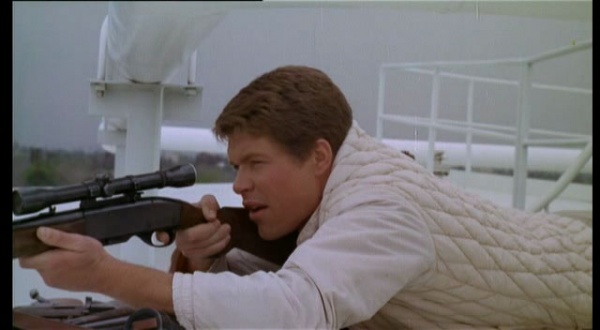Targets
Spoilers
"All the good movies have already been made". These words are spoken in the 1968 film TARGETS by Sammy Michaels, a film director played by film director Peter Bogdanovich. As the real director states in the disc's commentary, "I felt that way then, and still do!"
Byron Orlok (Boris Karloff) also feels that way. The elderly actor hobbles on crooked extremities and scares himself with his own reflection. He'd made a career of playing assorted heavies and villains in horror films, long the recipient of public acclaim ("...Mr. Boogey Man, King of Blood they used to call me. Marx Brothers make you laugh, Garbo makes you weep, Orlok makes you scream.") He screens his latest hokum and decides he's had enough. The scripts are getting worse and the terror in his trivial films are nothing compared to the real life atrocities he reads about.
Meanwhile, a clean-cut, boy next door young Vietnam vet named Bobby Thompson (Tim O'Kelly) proves Orlok's point by murdering his wife and mother, then setting atop a tower at an oil refinery and firing rounds at motorists on the L.A. freeway. Fleeing the police, he hides in a drive-in theater, finds a spot behind the screen, then again picks off unsuspecting folks with his rifle as Orlok's film THE TERROR unspools. Orlok himself is also there, quite reluctantly, scheduled to make his final appearance before retirement.
That's the summary, but let's look closer at Bogdonavich's inaugural piece of cinema. Its pedigree and history suggest the creation of yet another B-movie; Roger Corman was owed a couple of days' work by B-king Karloff. Bogdonoavich had assisted Corman on an earlier B. Impressed with the younger director, Corman gave him a chance to shoot his own movie, under the condition that scenes from Corman's film THE TERROR (yes, it's real, starring Karolff and Jack Nicholson!)be included and that Karloff show up for 2 days of new scenes. Bogdonavich and his wife penned a thoughtful script that Karloff liked so much he actually stuck around for 5 days of shooting.
Easy to see why. T
TARGETS is an insightful character study, basing its 3 principal characters on real people: Orlok is a riff on Karloff, Michaels is a version of Bogdanovich (and Peter's acting is quite good, I must say), and Thompson is based on real life serial murderer Charles Whitman, the infamous University of Texas sniper. This movie switches between Orlok and Thompson, both supremely dissatisfied with where life has led. Orlok makes several potent speeches about relevance, how he feels like an anachronism in an increasingly commercial and violent Los Angeles (while riding to his appearance, he wonders aloud when the town got so ugly after gazing at one car dealership after another). Sammy badgers Orlok to star in his latest, a film he promises will redefine the old man's career. Orlok likes the kid, respects his talent, but retirement is imminent. The industry has changed, and he does not see a place for him in it.
Michaels is also tired, but still optimistic.
Bogdanovich gets to vocalize his own opinions through this character, bemoaning the state of Hollywood. He's well qualified to do so: his interviews with notable directors like John Ford and Howard Hawks reek with authenticity. The director time and time again refers to yesteryear geniuses like Fritz Lang in his commentary; you know where his heart is. I think most true cineastes would agree, but I digress yet again...
Thompson says very little, but at one point does try reach out to his wife, albeit briefly. He feels he is "changing". Bogdanovich reveals this character mainly through action, following him around the city as he collects all sorts of weapons, letting Laszlo Kovacs' camera show the big and little things, quick flashes that reveal a bit about the boy. The camerawork is excellent, by the way. Kovacs and Bogdanovich have Bobby stalk around his own home as if he is a stranger, then frame him at the dinner table with his parents and wife (they all live together). That scene is eerily Norman Rockwell, eerie because we know that a bomb is ticking.
By the time we get a close up shot of the letter Bobbly had typed (all in red ink), our growing unease becomes realized, yet we're still unprepared for the massacre scenes to follow.
Like that freeway sequence. Bobby carries an arsenal of guns and fires them indiscriminately on the highway. He does it with the same emotionlessness we had seen when he was shooting soda cans for target practice. One especially chilling moment: after taking out a driver, Bobby watches the passenger climb out and attempt to flag down help. He waits and waits, then kills her. We see it all from his point of view. Is it a game to him? We heard him try to explain his toxic metamorphosis in progress to his wife, but she didn't listen. There seems to be self awareness on Bobby's part, yet a strange detachment from reality.
This is especially true of the climax; after Bobby kills dozens at the drive-in, Mr. Orlok finds him and both physically and verbally reprimands him. Bobby sees both the fictional Orlok onscreen and the real McCoy in front of him. There seems to be some confusion. Was that the problem? What is Bogdanovich trying to say here?
TARGETS is a compact little thriller with much to say, and artfully presented. It was a calling card for Bogdanovich, as those BBS guys took notice and offered him a job 2 years later: THE LAST PICTURE SHOW. In a way, TARGETS could be an unofficial eighth film in the BBS "America Lost and Found" collection. In a sprawling, ever changing Los Angeles, two men have lost their wills; one for a career, the other for life itself, both for a sense of purpose.



Comments